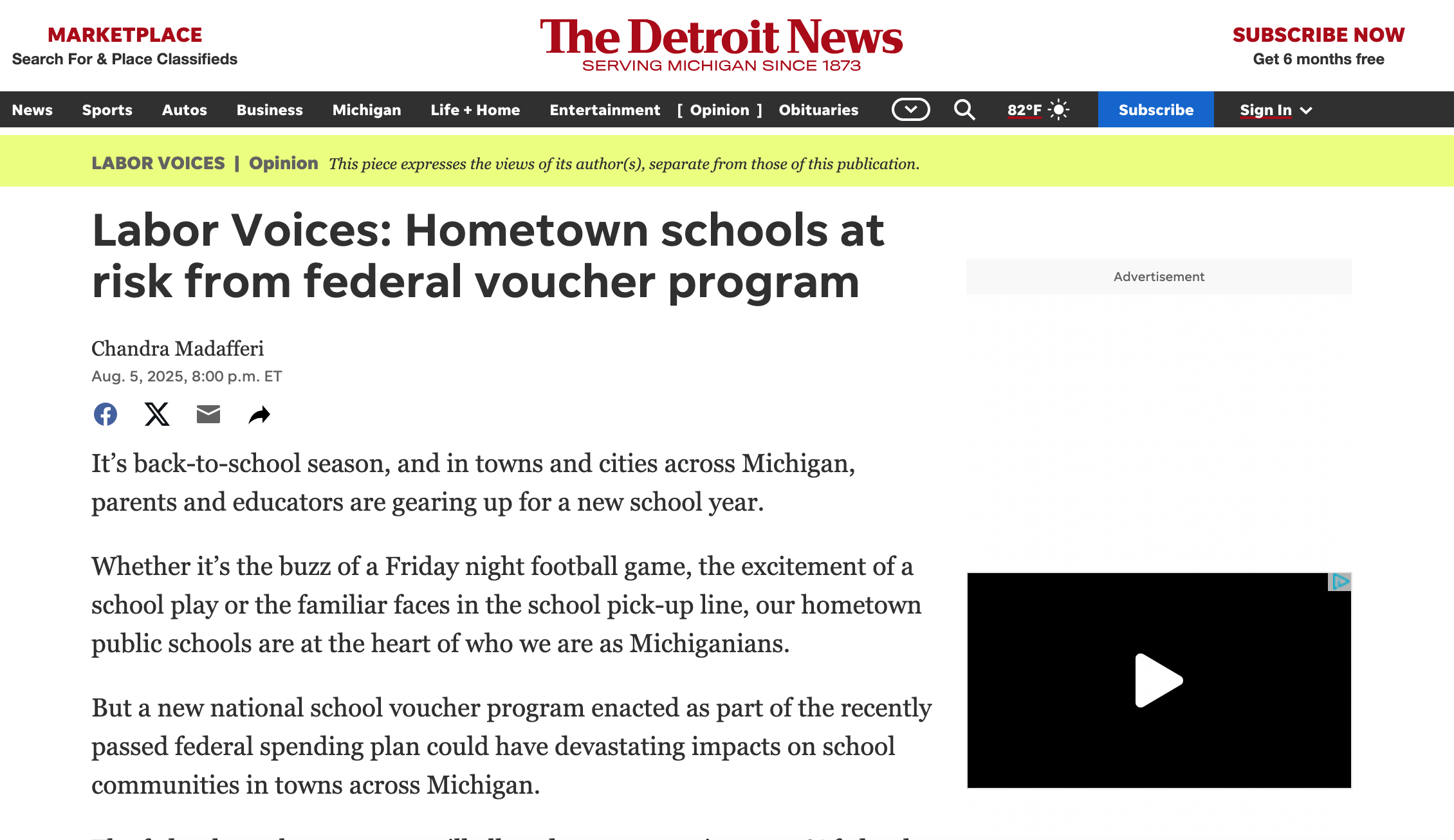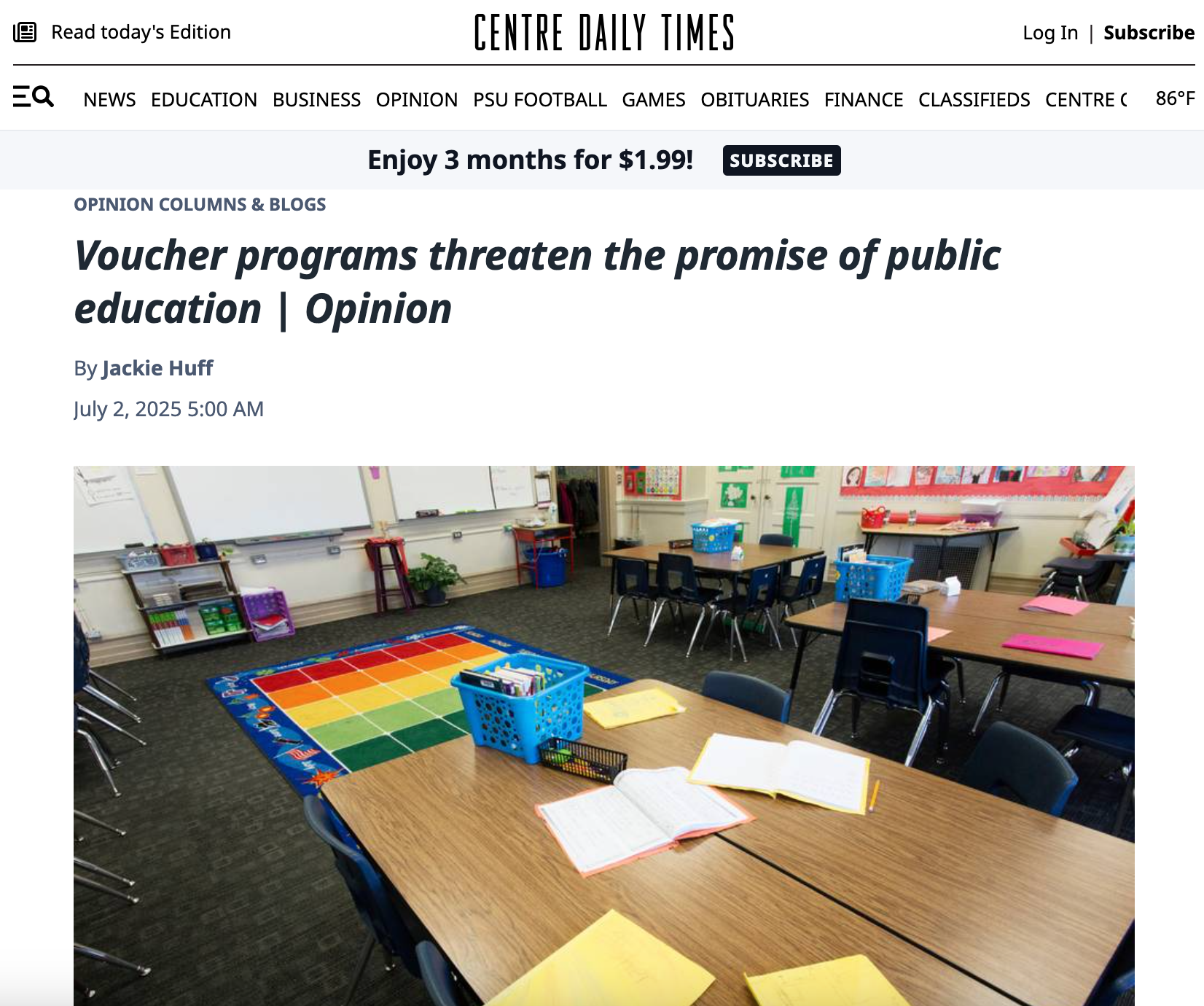ALL RESOURCES
FILTER BY TAG
Select a tag
- Academic performance
- Accessibility
- Accountability
- Advocacy
- Advocates
- Article
- Bill analysis
- Bill tracker
- Billionaires
- Blog post
- Civil rights
- Coalition building
- Community Schools
- Cost impact analysis
- Dark Money
- Data
- Disability
- Discrimination
- Drain funds from public education
- Education Savings Account (ESA)
- English language learners
- Fact sheet
- Fraud Waste and Abuse
- Graphic
- History
- Indigenous and Native Education
- Integration
- LGBTQ+
- Legislation
- Letter
- Litigation
- Messaging or talking points
- Model legislation
- National Voucher
- News
- Parents
- Personal narrative
- Podcast
- Policy brief
- Policymakers
- Radio
- Referendum
- Religion
- Report
- Rural communities
- Segregation
- Separation of church and state
- Slide deck
- Slides
- State Constitutional Right to Education
FILTER BY AUTHOR
Select an author
- Aaron Sanderford
- Alec MacGillis
- Allen Pratt
- Associated Press
- Bob Peterson
- Bruce Schreiner
- Catherine Caruso
- David Montgomery
- David Pepper
- Eli Hager
- Emily Walkenhorst
- Ethan Dewitt
- Geoff Mulvihill
- Hilary Wething
- Howard Fischer
- Jason Bailey
- Jessica Corbett
- Jim Collier
- Joe Dana
- Joshua Cowen
- Juan Perez Jr.
- Kiera Butler
- Laura Pappano
- Liam Amick
- Maurice Cunnningham
- Nora De La Cour
- Paige Masten
- Patrick Darrington
- Paul Hammel
- Phil Williams
- Rob Boston
- Robert Huber
- Rowan Moore Geretsy
- Sasha Pudelski

Federal Voucher Program – FAQs
The expansion of private school vouchers through the inclusion of a federal voucher scheme in the budget reconciliation bill passed in July is part of a broader assault on public education designed to privatize one of the most important common goods underpinning American democracy. Opting in to the federal program (the state’s choice), even to use voucher money for public education students, broadly endangers public education and opens the door to further voucher expansion, whether vouchers are already available in a given state or not.

States Must Reject Harmful Voucher Program
The federal voucher program contained in the budget reconciliation bill passed in early July will divert federal tax dollars from the U.S. Treasury and from services, including public education, that Americans rely on, to give to private and religious schools that pick and choose whom they educate and openly discriminate against some students and families.

Labor Voices: Hometown schools at risk from federal voucher program
Whether it’s the buzz of a Friday night football game, the excitement of a school play or the familiar faces in the school pick-up line, our hometown public schools are at the heart of who we are as Michiganians.
But a new national school voucher program enacted as part of the recently passed federal spending plan could have devastating impacts on school communities in towns across Michigan.

Scamming Our Schools: Robbing Our Students’ Futures to Line Their Pockets
Senator Mazie K. Hirono (D-HI) led a spotlight forum focused on the harmful consequences the Republicans’ “Big Beautiful Bill” will have on students, parents, teachers, and schools across the country. Specifically, the forum highlights the school voucher-related provisions from the bill, which would divert billions of dollars in taxpayer funding to create the first ever national school voucher program.

Voucher programs threaten the promise of public education
Today, we face a troubling trend. The push for voucher programs that redirect public funds to private schools threatens to abandon the fundamental promise of public education. While these programs sound appealing on the surface, they risk dismantling the very foundation that makes American education a beacon of opportunity for all.

Parents and Allies Oppose National Private School Voucher Program
Policymakers join parents, students, educators and allies to discuss how the national private school voucher program in the budget reconciliation bill would shift resources from public schools to wealthy people and private schools.

The School Voucher Debate – How School Choice Affects Low-Income Communities and Housing
The school choice movement, heavily supported by the Trump administration, aims to expand access to private and charter schools by redirecting public education funds through vouchers. These programs allow families to use taxpayer dollars to pay for private school tuition, but they come with serious consequences for public education, particularly in low-income and minority communities.

Column: Don’t let federal tax credits drain Bend-La Pine’s public schools
In the “big, beautiful bill” federal lawmakers have tucked in a proposal that threatens the very heart of public education, not only across the country, but right here in Central Oregon. The Educational Choice for Children Act creates a backdoor voucher scheme across all states, enabling billions of taxpayer dollars to be funneled away from public schools and into private institutions that operate without oversight, transparency or public accountability.

What’s Democratic About Giving Tax Dollars to Private Schools?
Public schools are essential for democracy—and they’re under attack. But the very policies being championed as their salvation may have a catastrophic impact on American education for generations. Public education advocate and historian Diane Ravitch unpacks how school choice policies like vouchers and charter schools are dangerous for democracy.

Segregation Academies Across the South Are Getting Millions in Taxpayer Dollars
Private schools across the South that were established for white children during desegregation are now benefiting from tens of millions in taxpayer dollars flowing from rapidly expanding voucher-style programs, a ProPublica analysis found.

How vouchers harm public schools
The growing popularity of vouchers raises a host of crucial questions and concerns. Key to informing the debate are questions of public finance and education quality. Is allowing public money to leave the public school system and follow kids to private schools the most effective or equitable way to make sure every child has access to an excellent education? Our view is that it’s not. Public dollars allocated to education should go to boosting spending in public systems, not subsidizing private education.

Oppose $20 Billion Federal Private School Voucher Program
House Republican leadership want to include a $20 billion private school voucher program in the 2025 tax-reconciliation bill. Known as the Educational Choice for Children Act of 2024 (H.R. 9462 in the 118th Congress), it would give away $5 billion per year for each of the next four years of federal taxpayer dollars to fund private school vouchers. Instead of directing resources to the public schools that 90% of American children attend, vouchers divert critical federal dollars to students already attending private schools and to schools that can cherry pick which students they want to educate.

Opinion: Trinity won't let me write about Amendment 2. Here's why I'm against it.
I’m a “private school kid.” I went to St. Francis of Assisi for first through eighth grades, and I am now a senior at Trinity High School. I will always be indebted to those schools for providing me with fantastic educations and experiences in the most formative years of my life. But to say I am disappointed with Trinity’s stance on Amendment 2 — a Kentucky ballot measure that would allow public tax funding to be used for private schools — would be an understatement.

Kentucky Voters Buried Private School Vouchers. One More Idea Must Die to Truly Reinvest in Our Public Schools
Despite the best efforts of anti-public school activists and the deep pockets of out-of-state billionaires, Kentucky voters resoundingly defeated the proposed constitutional amendment allowing public dollars to be diverted to private schools. The amendment was rejected in all 120 Kentucky counties and at the hands of a unique bipartisan coalition of rural, urban and suburban voters.

States Should Bolster, Not Undermine, Education Gains Made with ESSER Funds
Over half of states divert public dollars away from public schools to private schools through school vouchers. In 2024, 14 states enacted new, or expanded existing, school voucher programs, and Colorado and Kentucky are considering legalizing school vouchers through ballot measures. For example, Florida will spend almost $4 billion on its school voucher program this year, an amount that could easily replace Florida’s total annual ESSER loss if invested in public, rather than private, schools.

Christian Nationalists Are Opening Private Schools. Taxpayers Are Funding Them.
This politically charged approach to education likely isn’t for everyone—and because it’s a private school, it doesn’t have to be. Except for one thing: Dream City Christian Academy is one of a growing number of religious schools that are supported by public funds.

Protect Public Schools: An Advocacy Toolkit to Fight School Voucher Programs
School voucher programs and their many iterations (education savings accounts, tax credits, etc.) drain funds from public schools while disproportionately harming Black and Brown students from low-income backgrounds and students with disabilities. This toolkit provides the resources and information communities need to launch effective advocacy campaigns against school voucher programs in their state.

Keep Public Funds in Public Schools.Oppose $20 Billion National Private School Voucher Program Proposal
The Educational Choice for Children Act (H.R. 9462 in the
118th Congress) would give away $5 billion per year to
fund private school vouchers. Vouchers divert critical
funds from public schools to subsidize/pay for students,
many who already attend private schools. Private schools
cherry pick which students they want to admit, resulting
in discrimination.

PFPS Launches New Interactive Tool Examining Public and Private School Student Populations
Public Funds Public Schools has created an interactive research tool designed to inform and assist advocates in the fight against vouchers. The tool provides 2021-22 data on the numbers, geographical location (city, suburb, rural), and composition (race, income) of public and private school student populations in the states. It also shows the percentage of students attending religious schools and racially segregated schools.

Florida Private Education Vouchers Cost $4 Billion This School Year
Florida is already deeply underfunding its public schools. The state sits at the bottom of the national school funding rankings in ELC’s Making the Grade 2024 report, scoring grades of ‘F’ for funding level, for inequitable distribution of that funding, and for funding effort. As funding for private education vouchers has increased, it is consuming an ever larger portion of overall taxpayer funds directed to education, increasing from 12% of public funds spent on education in 2021-22 to 23% this year.
